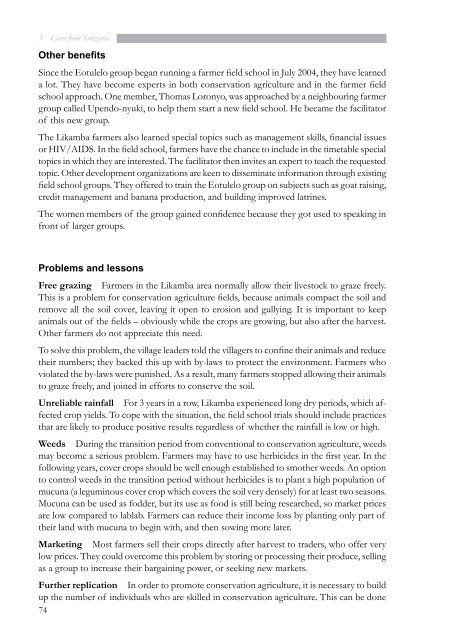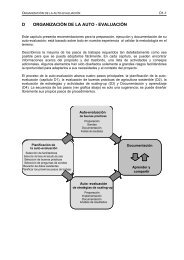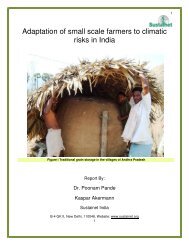cases from tanzania - Sustainet
cases from tanzania - Sustainet
cases from tanzania - Sustainet
You also want an ePaper? Increase the reach of your titles
YUMPU automatically turns print PDFs into web optimized ePapers that Google loves.
3 Cases <strong>from</strong> Tanzania<br />
Other benefits<br />
Since the Eotulelo group began running a farmer field school in July 2004, they have learned<br />
a lot. They have become experts in both conservation agriculture and in the farmer field<br />
school approach. One member, Thomas Loronyo, was approached by a neighbouring farmer<br />
group called Upendo-nyuki, to help them start a new field school. He became the facilitator<br />
of this new group.<br />
The Likamba farmers also learned special topics such as management skills, financial issues<br />
or HIV/AIDS. In the field school, farmers have the chance to include in the timetable special<br />
topics in which they are interested. The facilitator then invites an expert to teach the requested<br />
topic. Other development organizations are keen to disseminate information through existing<br />
field school groups. They offered to train the Eotulelo group on subjects such as goat raising,<br />
credit management and banana production, and building improved latrines.<br />
The women members of the group gained confidence because they got used to speaking in<br />
front of larger groups.<br />
problems and lessons<br />
Free grazing Farmers in the Likamba area normally allow their livestock to graze freely.<br />
This is a problem for conservation agriculture fields, because animals compact the soil and<br />
remove all the soil cover, leaving it open to erosion and gullying. It is important to keep<br />
animals out of the fields – obviously while the crops are growing, but also after the harvest.<br />
Other farmers do not appreciate this need.<br />
To solve this problem, the village leaders told the villagers to confine their animals and reduce<br />
their numbers; they backed this up with by-laws to protect the environment. Farmers who<br />
violated the by-laws were punished. As a result, many farmers stopped allowing their animals<br />
to graze freely, and joined in efforts to conserve the soil.<br />
Unreliable rainfall For 3 years in a row, Likamba experienced long dry periods, which affected<br />
crop yields. To cope with the situation, the field school trials should include practices<br />
that are likely to produce positive results regardless of whether the rainfall is low or high.<br />
Weeds During the transition period <strong>from</strong> conventional to conservation agriculture, weeds<br />
may become a serious problem. Farmers may have to use herbicides in the first year. In the<br />
following years, cover crops should be well enough established to smother weeds. An option<br />
to control weeds in the transition period without herbicides is to plant a high population of<br />
mucuna (a leguminous cover crop which covers the soil very densely) for at least two seasons.<br />
Mucuna can be used as fodder, but its use as food is still being researched, so market prices<br />
are low compared to lablab. Farmers can reduce their income loss by planting only part of<br />
their land with mucuna to begin with, and then sowing more later.<br />
Marketing Most farmers sell their crops directly after harvest to traders, who offer very<br />
low prices. They could overcome this problem by storing or processing their produce, selling<br />
as a group to increase their bargaining power, or seeking new markets.<br />
Further replication In order to promote conservation agriculture, it is necessary to build<br />
up the number of individuals who are skilled in conservation agriculture. This can be done<br />
74




